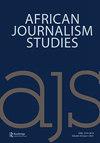PR-Driven Journalism Model: The Case of Ethiopia
IF 1.8
3区 文学
Q3 COMMUNICATION
引用次数: 4
Abstract
ABSTRACT Although the Ethiopian government has often claimed that state media follow development journalism (DJ) as their reporting style, broadcasting frequencies have been aggressively grabbed by public relations (PR) departments of government offices. The purpose of this research is to explore the type of journalism that has been implemented in the Ethiopian state media. The research follows a qualitative approach to conduct in-depth interviews and to do a document analysis. Apposite documents were gathered from Ethiopian Broadcast Corporation (owned by the federal government) and four regional state mass media houses. The researcher interviewed several media managers and journalists from the state media houses. The findings of the research show that PR practitioners are increasingly working as agenda-setters and gatekeepers while they deter investigative reporting, constructive criticism and ethical practices of the profession. The paper concludes that the PR-driven model of journalism is what the Ethiopian state media are practising. This paper also identifies the major features of the PR-driven journalism model. The research concludes that state media are often idealistic to implement DJ and suggests that community media needs to be considered for the implementation of DJ model of reporting.公关驱动的新闻模式:以埃塞俄比亚为例
虽然埃塞俄比亚政府经常声称国家媒体遵循发展新闻(DJ)作为他们的报道风格,但广播频率已经被政府办公室的公共关系(PR)部门积极地攫取。本研究的目的是探讨在埃塞俄比亚国家媒体已经实施的新闻类型。本研究采用定性方法进行深度访谈,并进行文献分析。从埃塞俄比亚广播公司(联邦政府所有)和四个地区国家大众传媒机构收集了相关文件。研究人员采访了几位媒体经理和来自国家媒体机构的记者。研究结果表明,公关从业者越来越多地成为议程制定者和看门人,同时他们阻碍了调查报道、建设性批评和职业道德实践。本文的结论是,公关驱动的新闻模式是埃塞俄比亚国家媒体正在实践的。本文还指出了公关驱动新闻模式的主要特征。研究认为,国家媒体在实施DJ模式时往往过于理想化,建议在实施DJ报道模式时应考虑社区媒体。
本文章由计算机程序翻译,如有差异,请以英文原文为准。
求助全文
约1分钟内获得全文
求助全文
来源期刊

African Journalism Studies
COMMUNICATION-
CiteScore
1.90
自引率
10.00%
发文量
18
期刊介绍:
Accredited by the South African Department of Higher Education and Training for university research purposes African Journalism Studies subscribes to the Code of Best Practice for Peer Reviewed Scholarly Journals of the Academy of Science of South Africa. African Journalism Studies ( AJS) aims to contribute to the ongoing extension of the theories, methodologies and empirical data to under-researched areas of knowledge production, through its emphasis on African journalism studies within a broader, comparative perspective of the Global South. AJS strives for theoretical diversity and methodological inclusivity, by developing theoretical approaches and making critical interventions in global scholarly debates. The journal''s comparative and interdisciplinary approach is informed by the related fields of cultural and media studies, communication studies, African studies, politics, and sociology. The field of journalism studies is understood broadly, as including the practices, norms, value systems, frameworks of representation, audiences, platforms, industries, theories and power relations that relate to the production, consumption and study of journalism. A wide definition of journalism is used, which extends beyond news and current affairs to include digital and social media, documentary film and narrative non-fiction.
 求助内容:
求助内容: 应助结果提醒方式:
应助结果提醒方式:


